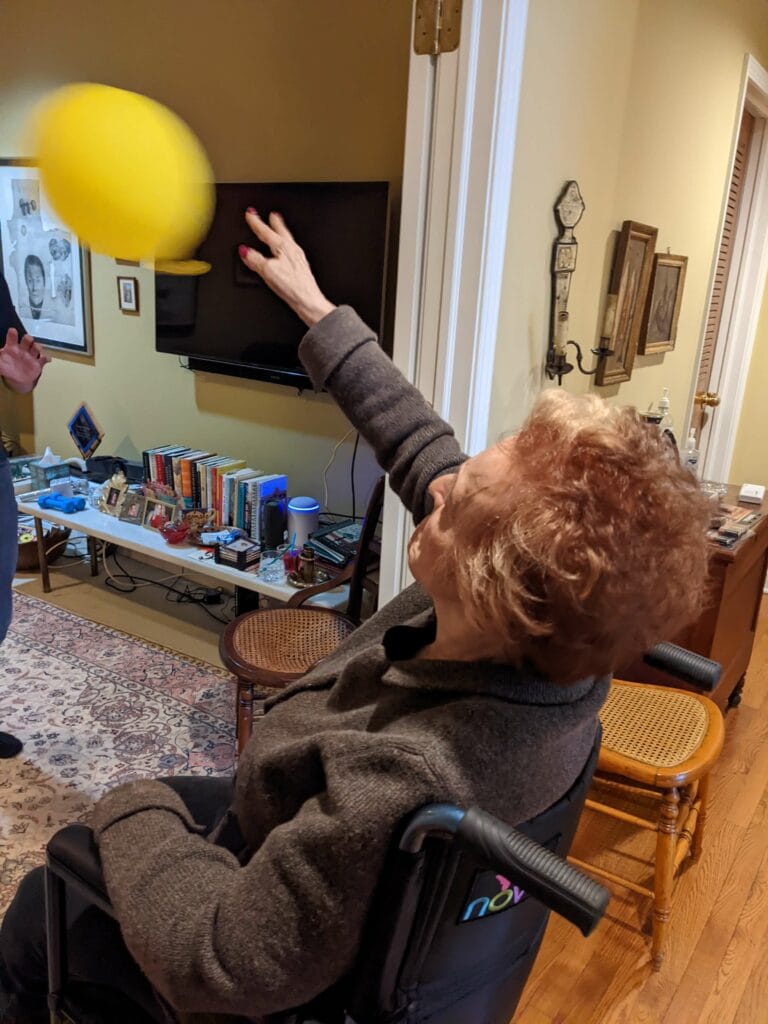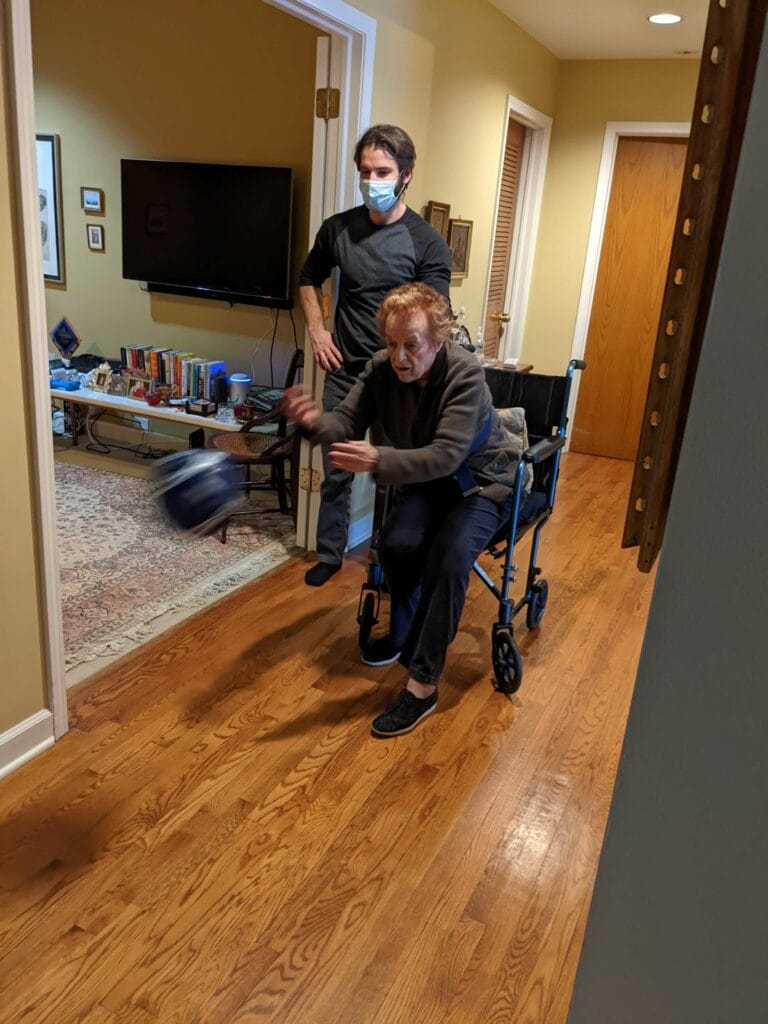
I can take you over to Goldy’s, a neighborhood pub in Forest Park, which hasn’t changed since Mike took over the business in 1986, famous for its Goldyburger, where on Fridays they serve deep fried perch, and there introduce you to Una the handsome Irish barkeep with the handsome Irish lilt.
I can show you the barstools where my brother Jim and I most often sit, where he is most prone to bust out an imitation of the banter of two stalwarts of Chicago sports, the late, legendary Chicago Cubs announcer Harry Caray, and his still-living color man, now announcing on the South Side for the White Sox, Steve Stone.
The two provided running commentary from an open-air booth at Wrigley field to Cub fans over radio and television for fourteen years. My mimic brother does both parts, the slurred speech of Harry, masking a stroke that didn’t keep him out of the booth and Stone’s more nasally intonations.
Certainly, they announced the game in 1983 on a day when the New York Mets came to town. Frank Howard was coach and the starting pitcher for the Mets, Walt Terrell, hit back-to-back home runs. It was a phenomenal feat, as any baseball aficionado can assure you, based on the stats alone. I was there with Arthur Russell to witness the whole thing. Ferguson Jenkins, starting pitcher for the Cubs, lost the game. Wait a minute, back up, Fergie Jenkins lost the game? His consolation for the loss was his election to the Baseball Hall of Fame in Cooperstown eight years later in 1991.
The point is my brother is an excellent mime, especially when he’s relaxed, among good people, and drinking Harps from a glass served by a handsome Irish lass. Under those circumstances, his pitch is perfect. The dial is set to ten.
On Christmas Eve, Jim, our mother, Carolyn, my daughter, Allison, and mom’s caregiver, Mariya, crowded into the den to watch It’s a Wonderful Life. I’ve heard Jim imitate Jimmy Stewart many times over many years. The way he enunciates George Bailey’s words in that line “You’re nothing but a scurvy spider, Mr. Potter” captures Stewart’s signature voice, which sounds like his jaw is still mending after somebody busted it open.
If you know the movie, the person who almost busts George Bailey’s jaw open is the misanthropic bar owner, Gus, who appears in a dystopian Bedford Falls, a doppelganger for the happier-go-luckier bartender, Gus, who appears in the everyday “real” Bedford Falls, where George Bailey already has a wonderful life but is far too stubbornly willful and confused by a mind fogged up with vague “worldly” ambitions to see the wonderful life that God has already granted him.
Instead, his awe-shucks boyish dreams can’t quite contain a cauldron of contempt from gushing from his pores. At great peril, he does not realize that the world of Bedford Falls is utterly complete. All George Bailey ever has to do is see it that way. It’s like Dorothy and her shoes.
Like his Caray / Stone voices my brother’s Stewart can be pitch perfect. Only on this night, he did not settle for ten. He pushed it up that tiny little bit, all that’s required, to beam a masterful performance into the thick weeds of cornpone. He maxed out the dial all the way to eleven.
Carolyn had the prime spot, seated in her wheelchair directly in front of the television. Jim was off to her right. She leaned to the left, with a comic’s instinct for breaking the fourth wall, to whisper to an imagined audience, “How’d I get mixed up with him?”
I was on the left side of mom ideally situated to pick up her aside, ideally situated as her other son to think how ridiculous that sounded, the mother pretending she wasn’t on hand when Jim was just a twinkle in the eye or ever changed his diapers.
It’s a Wonderful Life is my all-time favorite movie. I marvel how it folds in the mood and imagery of film noir into a perennial candidate for feel good movie of the year. I marvel at its durability. How it continues to teach me things. The premise that people routinely, tragically underestimate their influence on others, disparage or are blind to the good they dole out and that this failure might cause them to give up in one way or another has held me in its thrall for most of my life.
Our capacity for blindness is immense. Here’s George Bailey itching to get out to see the world, his idea of heaven, when right around him, right under his nose, is all the world, all the heaven he can handle. It’s literally there at his feet. And he can’t see it. Who is sent to point this out to him? Clarence, a goofy second-class angel.
Only George to the credit of his stubbornness doesn’t go down without a fight. He is brought down to his knees on that icy bridge where, on the brink of despair, he has returned to the scene where he tried to kill himself, for a second time.

As illustrated in this parable, unless you have a profound sense of your connectedness to others in your community, your life is literally hell. Hell on earth. You don’t have to wait for the afterlife. You can start that gig right away.
As George prays on the bridge, a miracle happens. His prayer is answered. And the astonishing thing about this is that the miracle was always present in himself, his spirit, and his mind. It happens perhaps only when the human spirit intersects with divine will when divine will comes from within.
This wondrously cheerful movie gleefully takes on the wondrously Quixotic chore of demonstrating to a theoretically very thick-headed audience exactly how thick in the head a human being can be. We’re all running around with logs in our eyes, it tries to tell us.
No wonder I missed some of the other things that movie wants to convey. But for this viewing I was seated next to Carolyn, the woman who uses grace in its most simplistic form, the most commonplace, daily expression we use to express gratitude, the words “thank you”. With a zest for candor that comes from grace, Carolyn Poplett is weaponized for love. These days she delivers “thank yous” rapid-fire until you are riddled with them, powerless, forced to relent, and love her back.
Jim and I choose caregivers for competence but mostly for how quickly they surrender to an infectious barrage of love bombs. This explains exactly why Mariya. Suzie, and Lyn have remained in her employ for so long. Carolyn and these amazing women love each other.
If the good people of Bedford Falls were more like my mother (or Mariya or Lyn or Suzie), you wouldn’t have had time to finish your popcorn. If everybody in Bedford Falls had thanked George Bailey with a measure of her grace, George Bailey would not have gotten anywhere near that bridge and Clarence would have to go elsewhere to get his wings. Carolyn is a woman who at the age of ninety-two, a woman deep into her dotage, is still powerful, more powerful than a baby who can coax grandpa to play on the carpet, because her innocence is recovered innocence and brings with it a deep-seated wisdom that not even dementia can uproot.
Well, something must have rubbed off. Before Carolyn got too far down that slippery slope, I started to ask her for advice. I figured that fierce instinct of maternal love would reel her back to a lucid state. With back-to-back failures in love and marriage, I wasn’t done with the old girl yet. I had plenty to talk with her about. I appealed to her for advice.
That it could almost instantly yank her out of the fog was astonishing to behold despite my confidence in the theory. When I tried it again and witnessed her mind snap back a second time, this tapping into the bond of mother and son, astonished me more. It seemed we were tapping into something close to the center of life itself.
This is the meaning of that Barbara Streisand lyric in the song “People” which asserts that people who need people are the luckiest people in the world. I never understood that. Never. Not even when I started writing this article. I get it now. It only took me 57 viewings of that movie and 64 years of my mother’s sturdy example to reach this point. God spare us all if any of you out there are thicker than me.
Acknowledging need of others is as simple as saying “thank you”. The rest you leave up to sincerity and intonation. Then, join the luckiest people.
Now finally at long last I have a useful clue to my failures in marriage and love. I was unlucky. I was unlucky because I didn’t acknowledge how much I needed another person in my life. And a world class, George Bailey worthy stubbornness kept me from seeing how subtly the quality of independence shifts from a virtue to a corrosive, slow-acting poison. This slow-acting property makes it worse, crueler and more difficult to detect. It is insidious like neuropathy or diabetes. Only it attacks relationships instead of the body. I explained this all to my mother this evening. I called her by phone and gave her a condensed version of my theory on need and my failures in relationships.
“That’s right,” she said.
“So, I need to explain this to my friend,” I said. “Even if it doesn’t bring us close. For the sake of doing what’s right.”
In my excitement, I exclaimed, “See, mom, I still need you as my mother? I just called because I had to tell you that,” I said.
“Thank you. Thank you very much,” she said. Then she told me her body was exercising inside and that it was full of joy.